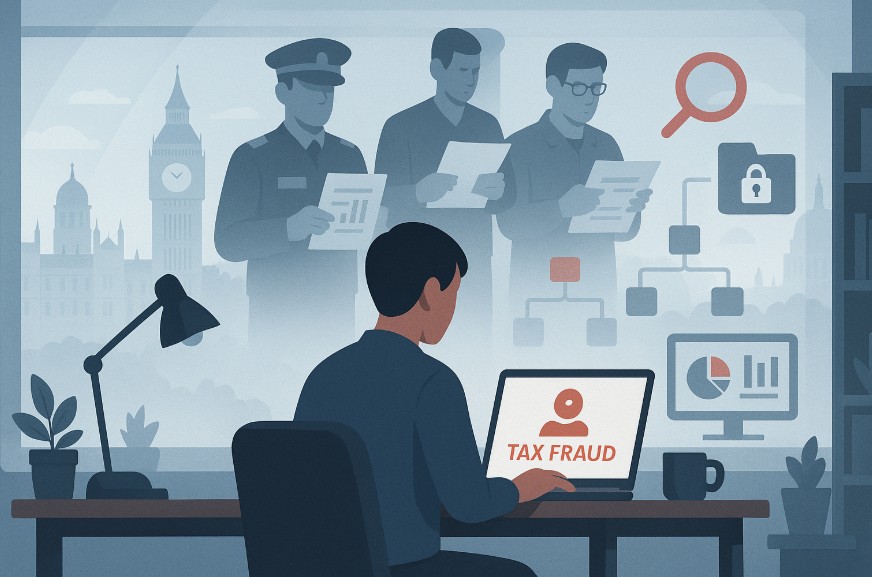Tax evasion is a significant challenge in the UK, with billions in unpaid taxes each year affecting the nation’s ability to fund vital public services. According to HM Revenue and Customs (HMRC), the UK’s tax gap, the difference between the total tax due and the amount actually collected, stood at approximately £31 billion in the 2021–2022 tax year.
This figure includes money lost to tax evasion, avoidance, and error. When individuals or businesses fail to contribute their fair share, others are left to shoulder the burden.
In response, HMRC has implemented systems that allow the public to report suspected tax fraud. But what exactly happens after you file such a report? This comprehensive guide walks through the entire process—from submitting a report to potential investigations and outcomes—while also addressing common questions and concerns.
What Is Tax Fraud in the UK?
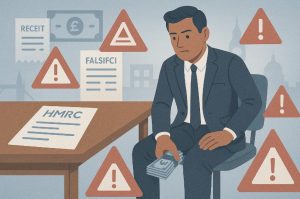
Tax fraud refers to the intentional misrepresentation or concealment of financial information to reduce tax liability. Unlike honest mistakes or misunderstandings, fraud involves deliberate acts aimed at evading taxes. Common examples include:
- Failing to declare all income, such as earnings from freelancing or rental properties
- Underreporting business profits to reduce corporate tax liabilities
- Making false expense claims to lower taxable income
- Operating without registering for VAT
- Employing workers without reporting wages for tax purposes
Such actions undermine the fairness of the tax system and can have far-reaching consequences, from funding cuts in essential services to distorting competition in the business world.
What Role Does HMRC Play in Tackling Tax Evasion?
HMRC is the UK’s primary tax authority and plays a central role in detecting and deterring tax fraud. It operates specialised units like the Fraud Investigation Service (FIS), which handles complex cases, and the VAT and Corporate Compliance Divisions, which focus on specific types of tax violations.
Over the years, HMRC has increasingly relied on advanced technology to detect irregularities. Its Connect system, launched in 2010, uses artificial intelligence and data analytics to cross-reference taxpayer information with data from banks, social media, property records, and international financial institutions.
With these tools, HMRC can build a comprehensive profile of a taxpayer’s financial behaviour and spot discrepancies that might otherwise go unnoticed.
Why Should You Report Tax Fraud?

Tax fraud doesn’t just affect the government, it affects every taxpayer. When someone avoids paying their fair share, that shortfall must be made up elsewhere, often through higher taxes or reduced public spending.
Reporting tax fraud is a way to:
- Protect public services such as the NHS, education, and transport
- Ensure a level playing field for compliant individuals and businesses
- Deter others from attempting similar offences
- Restore fairness and transparency in the economy
Moreover, reports from the public are an essential tool in HMRC’s enforcement efforts. They often uncover fraud that data analysis alone cannot detect.
Who Can Be Reported for Tax Evasion?
Anyone can be reported if they are suspected of violating tax laws. This includes:
- Self-employed individuals not declaring all their income
- Employers who pay workers cash-in-hand without proper tax documentation
- Landlords failing to disclose rental earnings
- Businesses that manipulate accounts or understate revenue
- Individuals with unreported offshore accounts
HMRC investigates all sectors, and reports can come from a variety of sources, disgruntled employees, business competitors, or concerned members of the public.
How Can You Report Someone to HMRC for Tax Fraud?

Reporting someone to HMRC for suspected tax fraud is a straightforward process designed to ensure both accessibility and confidentiality. HMRC provides several channels through which individuals can submit reports, allowing for both anonymous and identified submissions depending on the reporter’s comfort level.
Before making a report, it is recommended that you gather as much information as possible. This does not mean conducting an investigation yourself, HMRC explicitly advises against this for safety and legal reasons, but having details such as the individual’s or company’s name, address, and the nature of the suspected fraud can significantly improve the likelihood of HMRC taking action.
Reporting Channels
| Method | Description | Anonymity |
| Online Form | The most commonly used method. Available on the official GOV.UK website, it covers various types of tax fraud and allows anonymous reporting. | Optional |
| Fraud Hotline | You can speak directly to an HMRC representative by calling 0800 788 887 (or +44 203 080 0871 from outside the UK). Operating hours are Monday to Friday, 9am to 5pm. | Optional |
| Postal Reporting | Reports can be submitted in writing to: HMRC Fraud Hotline, Cardiff, CF14 5ZN. This method is slower but may be preferred in some cases. | Optional |
You may choose to provide personal details such as your name and contact number, especially if HMRC might need to clarify aspects of your report. However, this is not a requirement. All information provided is kept confidential.
While HMRC does not require evidence to open an initial assessment, detailed and specific reports are more likely to result in action. Vague or unsubstantiated reports may be logged but are unlikely to trigger further investigation without corroborating information.
It’s also important to note that the HMRC reporting system includes fraud related to income tax, VAT, Child Benefit and tax credit fraud, undeclared cash income, and more. Reports regarding other types of fraud (e.g., benefit fraud not related to tax, identity theft, or immigration fraud) should be directed to other government departments such as the DWP or Action Fraud.
What Happens After You File a Report?
Once HMRC receives a report, it initiates a structured process designed to assess the accuracy and significance of the information:
Initial Screening
Every report undergoes an assessment to determine if it falls within HMRC’s remit and whether it contains enough detail to warrant further action. This stage involves cross-checking the reported information with existing records.
Risk Assessment and Prioritisation
HMRC evaluates the report’s potential impact. High-value cases or those involving repeat offenders receive priority. Smaller reports may be logged for future reference, especially if part of a broader pattern of non-compliance.
Case Assignment
Cases deemed actionable are forwarded to the relevant unit. This could be the Fraud Investigation Service or another compliance team, depending on the type of suspected fraud.
Investigation Process
Investigations vary in scope. A minor discrepancy might trigger a routine compliance check, while more serious allegations could prompt a full-scale criminal investigation. Investigators may audit records, conduct interviews, and collaborate with international agencies if offshore assets are involved.
What Are the Types of HMRC Investigations?
Once a report is deemed credible, HMRC decides which type of investigation is appropriate based on the complexity, severity, and nature of the alleged fraud. Investigations vary in scope and intensity and may evolve depending on what the investigators uncover during the process.
Here are the primary categories of HMRC investigations:
Aspect Enquiry
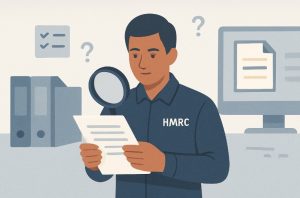
An aspect enquiry focuses on a specific section or element of a tax return. For example, HMRC might question unusually high business expenses or an unclear income source. These are the least intrusive types of investigations and often resolve quickly once additional documentation or clarification is provided.
Aspect enquiries are typically initiated when HMRC has identified a single anomaly but has no reason to believe the entire return is incorrect.
Full Enquiry

A full enquiry is a more thorough investigation. HMRC examines the entirety of the taxpayer’s financial records, including personal and business income, bank statements, invoices, and receipts. This type of investigation is reserved for cases where HMRC believes that inaccuracies may be widespread or systemic.
The process may take several months or even years depending on the complexity of the finances involved and the level of cooperation from the taxpayer.
Fraud Investigation

The most serious level of investigation is conducted by the Fraud Investigation Service (FIS). These cases often involve deliberate tax evasion and can lead to criminal prosecution. FIS investigators may employ advanced forensic accounting techniques and collaborate with other government departments and international bodies if the case involves offshore assets or financial concealment.
Investigations of this kind may involve:
- Hidden offshore accounts
- False invoicing
- Use of shell companies to disguise income
- Systematic underreporting of earnings
If criminal intent is found, cases are referred to the Crown Prosecution Service (CPS) for potential prosecution. Penalties can include heavy fines, asset seizure, and imprisonment.
Summary Table of HMRC Investigation Types
| Type of Investigation | Scope | Common Triggers | Possible Outcomes |
| Aspect Enquiry | Specific sections of a tax return | Single unusual entry or claim | Correction or penalty |
| Full Enquiry | Entire tax return and supporting documents | Pattern of inconsistencies or high-risk profile | Repayment, fines |
| Fraud Investigation | Criminal-level review of finances | Evidence of intentional evasion | Prosecution, asset seizure, prison |
What Are the Possible Outcomes of an Investigation?
Not all reports lead to prosecution, but HMRC ensures each one is properly reviewed. Possible outcomes include:
- No Further Action: If the report lacks evidence or the issue is minor
- Tax Repayment: The taxpayer is required to repay unpaid taxes, often with interest
- Penalties: HMRC can impose fines up to 100% of the unpaid tax
- Criminal Charges: Serious or repeated fraud can lead to prosecution and imprisonment
- Public Disclosure: In rare, high-profile cases, HMRC may publicise outcomes to deter others
What If You’ve Been Reported to HMRC?
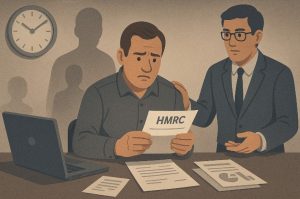
Discovering that you or your business has been reported for tax evasion can be a stressful and intimidating experience. In most cases, you will first learn about it when HMRC sends you a formal notification, typically a letter informing you that an enquiry or investigation is being launched into your tax affairs.
What to Expect?
Once you receive a notification, HMRC may request specific documents related to your tax filings. These might include bank statements, invoices, accounting records, and payroll data. In some cases, you may be invited to attend an interview with an HMRC officer, either at your place of business or at a designated HMRC office.
Typically, HMRC gives you 30 days to respond to their initial letter. Delays or non-cooperation can raise red flags and may escalate the case.
Common Mistakes to Avoid
Many people, when confronted with a tax investigation, make the mistake of contacting HMRC directly without legal guidance. This can be risky, especially if you unintentionally admit to something or provide incomplete information.
Another common error is attempting to destroy or withhold evidence. Not only is this illegal, but it also severely undermines your credibility and can lead to harsher penalties.
What You Should Do?
If you suspect you’ve been reported, or if HMRC contacts you regarding your tax affairs, here’s what you should consider doing:
- Seek Professional Advice Immediately: Engage a solicitor or accountant with experience in HMRC investigations.
- Respond Promptly: Meet deadlines and cooperate with reasonable requests.
- Disclose Known Issues: If there are anomalies in your accounts, disclose them proactively through your legal advisor.
Early intervention from a qualified professional can make a significant difference in the outcome of your case. In some instances, legal representation may help you reach a settlement with HMRC, avoiding further legal action.
How Long Will It Last?
The duration of an HMRC investigation depends on its complexity. A straightforward enquiry could be resolved in a few weeks, while more involved investigations, particularly those involving fraud or international transactions—can take over a year.
Potential Outcomes
If you’re found to have underpaid taxes, HMRC may require you to repay the full amount along with interest and penalties. In cases of intentional fraud, prosecution could follow, leading to criminal charges and reputational damage.
In contrast, if no wrongdoing is found, the matter will be closed without further action. However, HMRC may monitor your affairs more closely in the future.
Does HMRC Offer Rewards for Reporting Tax Fraud?
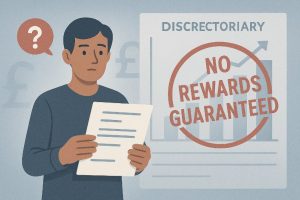
Unlike the United States, the UK does not have a formal reward scheme for whistleblowers. In rare instances, HMRC may issue a discretionary payment, but this is not standard practice. The emphasis is on civic responsibility and upholding the integrity of the system.
Are Whistleblowers Protected?
Yes. Under the Public Interest Disclosure Act 1998, whistleblowers are protected from retaliation or discrimination. HMRC also guarantees confidentiality. If you submit a report, your identity is never shared with the person or business involved, and HMRC will not follow up with you on the case outcome.
Conclusion
Tax fraud affects everyone. By reporting it, you contribute to a stronger, fairer, and more transparent society. HMRC’s investigative processes are designed to be fair, confidential, and thorough, ensuring that reports are taken seriously and resolved appropriately.
Whether you’re making a report or responding to one, understanding your rights and responsibilities is the first step in navigating the process effectively.
FAQs About Reporting Someone to HMRC
Can I report tax fraud anonymously to HMRC?
Yes, HMRC allows anonymous reporting through its online form, hotline, or by post.
What information should I include in my report?
Include names, addresses, dates, and specific details of the suspected fraud for the best chance of investigation.
Will I be told what happens after I make a report?
No, HMRC does not provide updates to the reporter to protect confidentiality and ensure fairness.
What happens if I’ve been reported and I’m under investigation?
You’ll receive a letter from HMRC requesting information or documents. It’s advisable to seek professional advice immediately.
Can I get in trouble for reporting someone wrongly?
As long as the report is made in good faith, you won’t face penalties, even if no fraud is found.
Does HMRC reward whistleblowers with money?
Not usually. HMRC may give discretionary payments in rare cases, but there is no official reward scheme.
How long do HMRC investigations take?
It varies. Simple enquiries may take weeks, while complex fraud investigations can last over a year.

